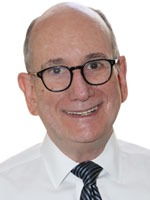A post-truth world
Attacks on freedom of the press and the rule of law
As I write this column, it’s been 50 years since the historic 1968 Democratic National Convention in Chicago. I remember it well because I was there.
I was a 21-year-old reporter/intern for a Chicago radio station and was assigned to help the regular news reporters cover the convention. I was there in person for the conflicts and confrontations of the convention including the “Battle of Michigan Avenue.” That was the night when Chicago police engaged in a bloody melee with protesters outside the main convention hotel on Chicago’s Michigan Avenue. It was a night I’ll never forget. It was the first, and hopefully the last time I experienced tear gas.
Much has been written about the violence that took place before and during the convention and the official report ultimately concluded that the police unleashed “unrestrained and indiscriminate” terror throughout the week.
That was my recollection and the recollection of the thousands of demonstrators, journalists, and bystanders who were also there. But many Americans were skeptical that the events could have happened, and, don’t be shocked by this, they blamed the media instead of the police.
That was 50 years before the term “fake news” became part of our vocabulary. But, according to an L.A. Times op-ed column by communication professor Leonard Steinhorn, “millions of Americans simply couldn’t believe that the police – who defended their communities and reflected their values and way of life – could act in the manner they saw on TV.” According to Steinhorn, “they didn’t call it ‘fake news,’ but many Americans thought it was.”
Steinhorn writes that “to some public officials, the press was as culpable and disdainful as the protesters.”
According to Steinhorn, Chicago’s Mayor Richard J. Daley himself derided “commentators and columnists,” blamed the media for inciting the violence and called the news coverage “distorted and twisted.”
That, of course, was absurd, but it sounds all too familiar and brings me to the main point of this column. Attacks on the media are nothing new, but the situation today is worse than ever.
We are living in a time where people regularly show disdain and disrespect for experts and expertise. The Oxford English Dictionary coined the term “post-truth” to describe this occurrence, describing it as “an adjective relating to circumstances in which objective facts are less influential in shaping public opinion than emotional appeals.”
This post-truth mentality results in a rejection of objective facts and is clearly seen in the form of recurring attacks on fact-providing institutions such as the judiciary, academia, intelligence agencies and, of course, the media.
Attacks on the media and attacks on trial lawyers have a lot in common. Both groups are demeaned by critics for their belief in truth, facts and the core value that wrongdoers must be held accountable. This may explain why historically there is a close association between trial lawyers and the press. To trial lawyers, Freedom of the Press is almost as important as the Rule of Law.
The Nation, in an editorial in August called “A Press Under Siege,” wrote that, “If there is one constant to Donald Trump’s presidency, it’s his determination to weaken democratic norms and institutions.” They added that, “At the core of this assault on democracy is Trump’s unwavering obsession with undermining the media outlets that attempt to hold him to account.” The editorial added that the President and his supporters “know that they must make people reject journalism that speaks truth to his power.” It’s the same argument that’s used against trial attorneys and our civil justice system that holds powerful interests accountable when they do harmful things.
The president regularly calls the news media the “enemy of the people.” As the Daily News said in an editorial on August 16, “The news media are not enemies of the people, and a free press is critical to an informed citizenry that seeks to hold its government accountable.”
The editorial continued with, “Freedom of speech and of the press and the right to peaceably assemble and to petition the government for redress of grievances are the fundamental rights that ensure our government is accountable to the people. They are the very rights that give power to the people, and we should not take those rights lightly or allow them to be threatened.” Those words could have been written by a trial lawyer.
The Chicago Convention of 1968 is far from the only time that politicians blamed the media for the truthful reporting of events that they didn’t want people to know about. In 1973, Richard Nixon blamed the press for reporting on the Watergate events he created. Today, attacks on the media are so common they practically go unnoticed. One reason may be the ease by which they are disseminated through the various channels of social media. Two centuries ago, social media didn’t exist, but Founding Father George Mason predicted what is happening today when he wrote “freedom of the press is one of the greatest bulwarks of liberty and can never be restrained but by despotic governments.” Trial lawyers understand this completely.
Stuart Zanville

Stuart Zanville is the Executive Director of the Consumer Attorneys Association of Los Angeles (CAALA). Contact him at (213) 487-1212 or by e-mail: stuart@caala.org.
Copyright ©
2025
by the author.
For reprint permission, contact the publisher: Advocate Magazine
